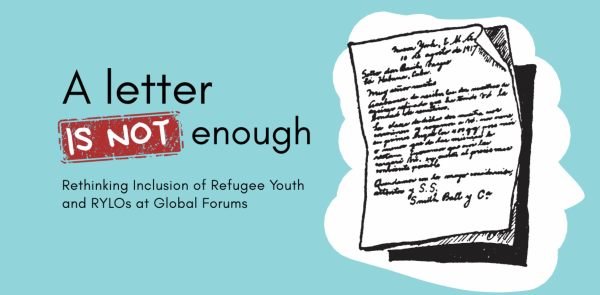The Global Refugee Youth Network (GRYN) is an independent youth-led network that supports young refugees to develop their capacities, empower and help themselves, lead initiatives to respond to their communities’ needs, and advocate for the changes they feel are important. GRYN was launched by and is housed at WRC.
Every year, global convenings like the Global Refugee Forum progress review in December (previously the High-Level Officials Meeting) become milestones for reflection, commitment, and renewed promises for action toward a better world for refugees. And yet, for many refugee youth leaders, these meetings are both a beacon of hope and a reminder of exclusion.
GRYN believes that inclusion isn’t just about sending an invitation to participate in a convening. It’s also about creating pathways for participation that are real, resourced, and respectful. Too often, leaders pay lip service to “youth inclusion” in their speeches, but they neglect the practicalities of how to make it happen, leaving refugee youth without the means to engage. Inclusion without context, financial support, or sustainability is not true inclusion; it is tokenism.
An Invitation Without Support Is Not Inclusion
An invitation to attend these forums, without provision of the necessary support to do so, is not an opportunity; it is a barrier to entry masquerading as inclusion. It is not uncommon for refugee leaders or refugee youth-led organizations (RYLOs) to receive invitations to high-level meetings that do not offer any financial support to participate. While these invitations may be framed as a gesture of recognition, they often leave youth groups in a precarious position, forcing them to scramble for emergency funding, rely on overstretched partners, or even use personal resources to travel and attend.
This practice shifts the burden of inclusion onto the very communities that these processes claim to uplift. Instead of empowering young leaders, it risks deepening inequality.
The Hidden Cost of Informality
Many refugee youth initiatives are born out of necessity, in contexts where displacement and lack of infrastructure make formal registration difficult or even impossible. These groups often operate without legal status, which means they are excluded from traditional funding channels and overlooked by event organizers who default to engaging with established institutions.
Informality should not be mistaken for a lack of legitimacy. On the contrary, informal grassroots groups are often closest to the communities and issues at hand. By sidelining them due to structural barriers, global processes inadvertently reinforce the very inequalities they claim to address. If inclusion is to be real, it must adapt to the realities of refugee youth leadership rather than forcing youth to fit into rigid systems that were not designed for them.
What about Those Who Never Get Invited in the First Place?
Beyond those who receive invitations without adequate support, there is a far larger group: refugee youth leaders and RYLOs who are never invited at all. Many remain completely unaware that these global processes even exist. Their absence is not due to a lack of leadership or impact but rather to gaps in outreach, recognition, and inclusion mechanisms.
This exclusion often begins well before the global moments themselves, in the lead-up and preparation stages during which agendas are shaped and priorities are set. Without engagement at these earlier steps, refugee youth are left out not only from the final event, but also from influencing the process that leads there.
When only a select few people are repeatedly invited—often those already connected to international spaces—the diversity and richness of refugee youth leadership are flattened. This risks creating a cycle in which the same voices are tokenized as representatives, while countless others are left out. Real inclusion means widening the circle, reaching beyond the “usual” faces, and making sure that opportunities are not just for the few, but for the many.
A Collective Responsibility
The responsibility to change this dynamic lies with all of us—organizers, donors, partners, and networks. Refugee youth participation cannot remain symbolic. It must be intentional, resourced, and grounded in context.
GRYN believes that tokenism must give way to transformative inclusion. Participation must come with the tools, financial support, and recognition that allow refugee youth to fully engage. Otherwise, global forums risk becoming stages where refugee youth are showcased but not empowered, spoken about but not heard.
Call to Action
As we approach the Global Refugee Forum progress review, we call on stakeholders to do the following:
- Event organizers: Ensure dedicated spaces and decision-making roles for refugee youth within official delegations. Assist with the procurement of documents necessary for refugee youth to attend, including entry and exit permits and convention travel documents. It is important to consider that some refugee youth who are invited will be unable to get travel documents or visas due to country policies and restrictions.
- Event leadership: Create intentional entry points for refugee youth and RYLOs. This means leaving open pathways to apply for participation, not just relying on closed invitations, and ensuring there are open presentation spaces within the events themselves. Without these opportunities, most refugee youth remain outside the room and lose visibility. True inclusion requires designing events where including refugee youth leadership is not an afterthought, but rather an integral part of the agenda.
- Youth leaders: If you receive repeated invitations to events, do not act as a gatekeeper. Instead, share participation opportunities with other young people who are facing struggles. They don’t want to be represented by people who read their stories; they want to speak for themselves.
- Organizations and donors: Allocate flexible funding to invited RYLOs and youth advocates.
- All partners: Identify, support, and uplift young refugee leaders from the ground up — not only those already known or connected.
Let us work together to ensure that this forum, and those that follow, are shaped with and by refugee youth—not in their absence. A letter of invitation is a start, but it is not enough. True inclusion requires ensuring that those who are invited can actually take their seats at the table.


